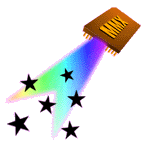One other feature of MMX which must be mentioned is improved network
interaction, as Intel pushes to overcome the 'bandwidth barrier'
of the Internet.
The drive is towards applications that run primarily
on the PC, with Internet updates only when absolutely necessary.
The best PC game ever, Elite for the BBC micro, overcame memory
restrictions in a similar manner, only making occasional calls
to the disk drive.
As PCs are so fast, and the Internet so slow,
this seems the right way forward.
It could also mean a revolution
in networked games.
POD is playable with a range of options,
including multiple player scenarios with some participants on
a LAN, and some connected across the Internet.
D
oom and Quake
may have set the standard for playability in these games, but
playing them across the Internet is a whole new shooting match.
 Videoconferencing should benefit from similar techniques, and
may fulfil its promise with MMX.
Videoconferencing should benefit from similar techniques, and
may fulfil its promise with MMX.
One final caveat - MMX is likely to reduce performance on standard
floating point applications, because it is so tuned to multimedia
calls, but most users, whether business or home, don't really
need the bravura performance of the higher specification Pentium
processors anyway.


 Videoconferencing should benefit from similar techniques, and
may fulfil its promise with MMX.
Videoconferencing should benefit from similar techniques, and
may fulfil its promise with MMX.
